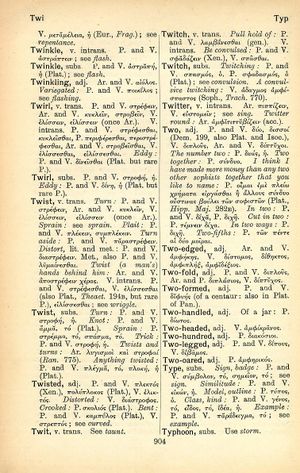two: Difference between revisions
From LSJ
αὐτὸν κέκρουκας τὸν βατῆρα τοῦ λόγου → you have struck the very threshold of the argument, you have struck the most important and chiefmost point
(Woodhouse 5) |
(CSV5) |
||
| Line 1: | Line 1: | ||
{{ | {{Woodhouse1 | ||
| | |Text=[[File:woodhouse_904.jpg|thumb|link={{filepath:woodhouse_904.jpg}}]]'''adj.''' | ||
P. and V. δύο, δισσοί (Dem. 199, also Plat. and Isoc.), V. διπλοῦς, Ar. and V. δίπτυχοι. | |||
<b class="b2">The number two</b>: P. [[δυάς]], ἡ. | |||
<b class="b2">Two together</b>: P. [[σύνδυο]]. | |||
<b class="b2">I think I have made more money than any two other sophists together that you like to name</b>: P. [[οἶμαι]] ἐμὲ πλείω χρήματα εἰργάσθαι ἢ ἄλλους [[σύνδυο]] οὕστινας βούλει τῶν σοφιστῶν (Plat., ''Hipp. Maj.'' 282E). | |||
<b class="b2">In two</b>: P. and V. [[δίχα]], P. [[διχῆ]]. | |||
<b class="b2">Cut in two</b>: P. τέμνειν [[δίχα]]. | |||
<b class="b2">In two ways</b>: P. [[διχῆ]]. | |||
<b class="b2">Two-fifths</b>: P. τῶν [[πέντε]] αἱ δύο μοῖραι. | |||
}} | }} | ||
Revision as of 10:06, 21 July 2017
English > Greek (Woodhouse)
adj.
P. and V. δύο, δισσοί (Dem. 199, also Plat. and Isoc.), V. διπλοῦς, Ar. and V. δίπτυχοι.
The number two: P. δυάς, ἡ.
Two together: P. σύνδυο.
I think I have made more money than any two other sophists together that you like to name: P. οἶμαι ἐμὲ πλείω χρήματα εἰργάσθαι ἢ ἄλλους σύνδυο οὕστινας βούλει τῶν σοφιστῶν (Plat., Hipp. Maj. 282E).
In two: P. and V. δίχα, P. διχῆ.
Cut in two: P. τέμνειν δίχα.
In two ways: P. διχῆ.
Two-fifths: P. τῶν πέντε αἱ δύο μοῖραι.

